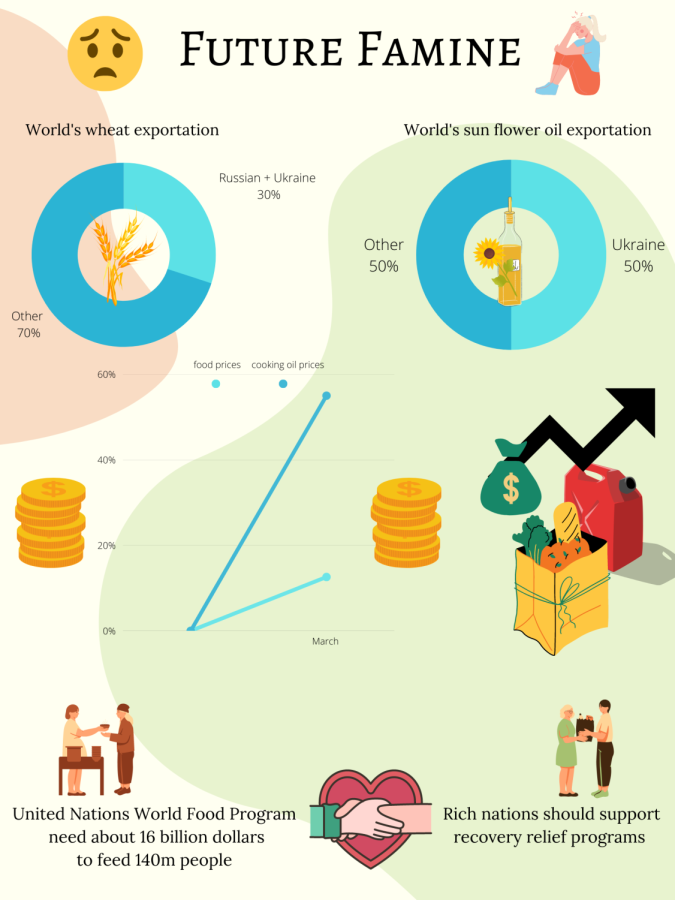The threat of a famine and what it means to Pleasanton
In the near future, the world may be faced with a famine. What will the world look like then?
May 27, 2022
2022 brings no shortage in global crises, leading to economic troubles, political woes, and social unrest. Permeating through all of this is the threat of famine, economists predict.
What can be some causes?
Russia and Ukraine export almost 30% of the world’s wheat, with Ukraine producing around 50% of the world’s sunflower oil. When Russia invaded Ukraine in late February, this trade was disrupted; exports stopped and production focused on war.
The most obvious impact is the reduction of wheat production, a food staple around the world. In fact, food prices, in general, have increased by 12.6% in March, just a month after the invasion – and it seems that this disruption will not end soon. Other reports show that cooking oil prices have increased by 55% as well.
Although the EU, United States, India, and other countries can cover the losses in grain, it will take time and effort in order to achieve regular levels of production again.
However, other factors contribute to the skyrocketing food prices as well: global supply chain disruptions and gas prices. If supply chains are disrupted, global food supplies will also be affected.
This will not only lead to increased prices in our community; countries in Africa and the Middle East rely on Ukrainian grain for their supply of grain. This can lead to famines all across the world.
“IN less developed countries, they will suffer. In more developed countries, they will be able to stabilize until the supply chain shortages come back.” said Joshua Yu (‘23).
We can expect many unfavorable consequences in the wake of a global famine, similar to recession-like circumstances where a lack of capital generally resulted in sudden lifestyle changes, rationing of necessary supplies, and even societal delves under the poverty line.
“I was in college at the time, so just dealing with college debt interest rates and all the other expenses- house loan interest rates, car loan interest rates, credit card loan interest rates- was harsh,” said Darren Pagthakhan, an AP Literature teacher here at Amador.
What can we do?
With the threats of famine looming ever closer, countries are bracing for the impact. The United Nations’ World Food Program needs around 16 billion dollars in order to feed around 140 million people throughout 2022.
The 2008 recession also caused food shortages throughout the world, creating riots. This time, however, there is hope that this can be prevented.
Rich nations are impacted less; if they support relief and recovery programs such as the World Food Program, it can help reduce hunger and unrest.
“Donating food from more developed countries to less developed countries could help remedy this situation,” said Yu.
However, countries with a huge surplus of food have been coincidentally affected by other crises as well, whether they be natural or man-made.
India- a country that prides itself on its recent agricultural success– has recently experienced heat waves that have dried up crop surpluses all across its rural land, leaving the nation with no choice but to block its international food trade.
Coupling that with the fact that the Russo-Ukrainian War has stunted food supplies almost by a third, people have begun to believe that the most surefire way around a famine would be to resolve the leading global issues of the time.
“The best way to once again ensure a steady supply of food would be to end the war as quickly as possible. Step up the sanctions, make Russia realize what they’re doing to their economy,” said William Huang (‘22).
To resolve said global issues, governments need to take charge and lead their nation through these tumultuous times. One of the first steps towards reform would be to establish clear priorities and tone down emphasis on some of the less pressing matters of today.
“They would have to sort out their priorities. Maybe don’t finance the military with more than 15% of the national budget, and instead put that money into things that would ensure global sustenance before a famine actually hits us,” said Huang.
Avoiding or even surviving the famine isn’t just a practical issue, however- with human lives at constant and grave risk, reforming society for the sake of living through the current crises requires an intrinsic solution.
“ [Famines] are political, social, even philosophical situations, one we need to look at from the human perspective. Once we start helping those that need our help the most is when we can start resolving these issues,” said Pagthakhan.
The plethora of global issues around the world have posed the challenge of a looming famine over the human populace, and the situation seems to be worsening by the minute. To recover from these pressing issues and revert back to a pre-COVID level of global growth, human society as a whole needs to forsake standard political and economical policy and emphasize reforms essential to recovering from this crisis we ourselves are in.






